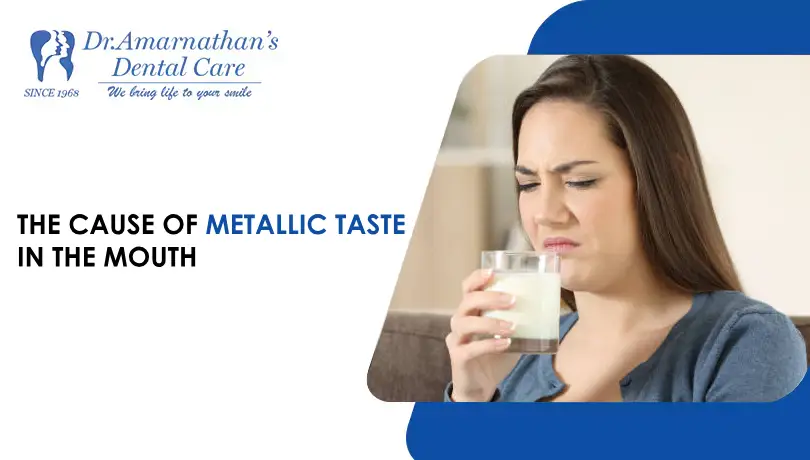
The cause of metallic taste in the mouth
A metallic taste in mouth is a sign of a taste problem. This feeling in your mouth is exactly like when you suddenly taste metal while not eating anything metallic. It can occur for various causes, including taking certain medications, not cleaning your mouth, having dental problems, eating particular foods, being pregnant, having a dry mouth, or having specific health concerns.
Causes for metallic taste in mouth
Normal Causes
1) Pregnancy
During pregnancy, hormonal changes can cause many kinds of taste changes, including a metallic taste in the mouth. While the specific reason for these conditions is unknown, fluctuations in hormone levels, particularly estrogen, are thought to influence the sense of taste.
Changes in saliva content and production in pregnancy may also contribute to a metallic flavor sensation. Having a metallic taste in the mouth during pregnancy is normal and usually safe, but it can irritate some women.
Tips: Staying hydrated, practicing excellent dental hygiene, and eating small, frequent meals might help ease the discomfort.
2) Dry Mouth
Dry mouth, also known as xerostomia, can cause a metallic taste in the mouth owing to decreased saliva production. Saliva helps wash away food particles and germs; therefore, when there is less saliva, these particles might stay in the mouth, resulting in a metallic flavor impression.
Dry mouth can be caused by a variety of situations, including dehydration, specific medications, mouth breathing, smoking, and underlying medical problems, including diabetes or Sjogren’s syndrome.
Tips: Treating the underlying cause of dry mouth, staying hydrated, chewing sugar-free gum, and utilizing saliva substitutes can all help reduce the metallic taste.
3) Vitamins
Specific vitamins, particularly those containing minerals such as iron or zinc, can occasionally produce a metallic taste on the tongue as a side effect. These are more likely to have higher doses of these vitamins. When these minerals are taken in excess, they can build up in the saliva and affect taste perception, causing a metallic taste experience.
Additionally, vitamins with artificial sweeteners or other additions may contribute to taste alterations.
Tips: If you notice a metallic flavor after taking vitamins, try reducing the dosage or switching to a different formulation.
Abnormal Causes:
1) Gingivitis
Gingivitis, or gum inflammation, can sometimes result in a metallic taste in the mouth. When the gums become inflamed due to gingivitis, they may bleed freely, allowing tiny quantities of blood into the mouth. This blood can mingle with saliva, producing a metallic flavor impression. Furthermore, the bacteria associated with gingivitis might create metabolites that add to the metallic flavor.
2) Indigestion
When your stomach struggles to digest food, indigestion can occasionally result in a metallic taste in your mouth. When stomach acid backs up into the esophagus, it can cause a metallic flavor in your mouth.
This acidic reflux can occasionally reach the lips, affecting taste perception. Indigestion can also cause poor oral hygiene practices, such as not cleaning your teeth adequately, which can add to a metallic taste.
3) Sinus Infection
A sinus infection, when the sinuses become inflamed and swollen, can occasionally cause a metallic taste in the mouth. When the sinuses get clogged, it can impair the sense of smell, strongly related to taste. As a result, the brain may perceive some tastes differently, resulting in a metallic flavor impression.
Also, postnasal drip, prevalent with sinus infections, can cause mucus discharge into the throat and mouth, affecting taste perception. Treatment of the sinus infection with proper medicine, such as antibiotics or decongestants, can help relieve the metallic taste.
4) Kidney Failure
Kidney failure can cause a metallic taste in your mouth because toxins accumulate in your body when your kidneys do not work correctly. These poisons can alter how you experience taste.
Furthermore, electrolyte imbalances, such as excessive potassium or calcium levels usually controlled by the kidneys, might impair your taste perception. Furthermore, dry mouth, commonly linked with renal failure, might exacerbate the metallic flavor impression. To properly treat renal failure, you should address and discuss these symptoms with your healthcare doctor.
5) CNS disorders
Central nervous system (CNS) illnesses, such as those affecting the brain and spinal cord, can occasionally induce a metallic taste in the mouth. These conditions may interfere with the way your brain perceives taste signals.
Furthermore, substances used to treat CNS diseases may have side effects that impact how things taste, including making them taste metallic. Moreover, CNS diseases may change saliva production or composition, influencing taste perceptions.
7) Diabetes
Diabetes may cause a metallic taste in the mouth due to excessive glucose levels in the saliva. This extra sugar might provide a metallic or sweet taste. Diabetes can also raise the risk of oral health problems such as gum disease and bacterial infections, which can influence taste.
Fluctuations in blood sugar levels can disrupt electrolyte balance and affect taste perceptions. If you have diabetes and are experiencing a metallic flavor, you should monitor your blood sugar levels and dental hygiene.
8) Chemotherapy
Chemotherapy can cause your tongue to taste metallic, damaging your taste buds and saliva cells. It may affect how foods taste and make them appear metallic.
Additionally, chemotherapy may cause a dry mouth or changes in saliva, which can contribute to the metallic taste experience. Chemotherapy can sometimes produce nausea or vomiting, which leaves your tongue with a metallic taste. Staying hydrated and exploring new meals or flavors may help if you’re feeling this.
9) Allergies
Allergies may cause a metallic taste in the mouth because they interfere with your sense of taste. Allergies can also produce stuffy or runny noses, leaking mucus into your mouth and altering how things taste. Treating your allergy symptoms might be beneficial if you experience a metallic flavor and have allergies.
10) Chemical exposure
Certain chemicals, such as those found in cleaning products or industrial environments, might cause your tongue to taste metallic. These compounds might interfere with your perception of taste or irritate your tongue.
If you have a metallic taste after chemical exposure, obtain some fresh air and rinse your mouth with water immediately. If the taste lingers or worsens, it is advisable to consult a doctor.
11) Oral candidiasis
Oral candidiasis is an oral cavity infection caused by Candida albicans. It is commonly known as oral thrush and can cause a metallic taste in your tongue. It occurs when an excess of Candida yeast is on your tongue.
This yeast disrupts your mouth’s natural equilibrium and can make foods taste strange, like metallic. Treating oral thrush and maintaining proper oral hygiene help eliminate the metallic flavor.
12) Mercury poisoning
Mercury poisoning produces a metallic taste in the tongue by accumulating in oral tissues, which affects the sense of taste. Its toxicity to the brain system further disrupts taste receptors.
Gastrointestinal disorders such as nausea might exacerbate the metallic taste impression. If you have symptoms like weakness, tremors, or difficulty breathing, you should immediately seek medical assistance.
13) Lithium compounds
Lithium compounds impact how things taste because they can leave a metallic taste in your mouth. When you take lithium for mood disorders like bipolar disorder, it might interfere with your taste buds and cause items to taste metallic. Lithium is known to cause a metallic flavor.
If you see it while taking lithium, you should consult your doctor. They can help you determine if it’s connected to your medicine and, if so, change your treatment plan.
14) Dementia
Dementia usually does not generate a metallic taste in the mouth. However, medication used to treat dementia-related symptoms may have taste-related side effects, perhaps resulting in a metallic taste.
Additionally, changes in dental hygiene or food habits caused by cognitive impairment may impact taste impressions. If a person with dementia develops a metallic taste, they should consult a healthcare specialist to evaluate the reason and proper treatment.
Additionally Pine nut syndrome, Cold, Poor Hygiene, and some Medication supplements can also cause a metallic flavor in mouth.
Pine nut syndrome
Pine nut syndrome can cause a metallic taste in your mouth after eating some pine nuts, particularly those from China. It is unclear why this occurs, although it is considered to be due to chemicals in the nuts reacting with your taste senses.
The metallic taste might remain for days or weeks, although it typically fades away. If you have this after eating pine nuts, it is recommended to avoid them for a time until the flavor subsides.
Cold
Having a cold might cause your tongue to taste metallic. This might be due to a stuffy nose, cold medication, or dehydration. When you’re feeling ill, your taste sense changes, making things taste different, especially metallic. Typically, the metallic taste disappears as the cold cures.
Medications and supplements
Medications and supplements may sometimes leave a metallic taste in the mouth. Certain medicines, particularly those containing minerals such as iron or zinc, may produce this feeling as a side effect.
Furthermore, certain drugs can change saliva production or interfere with taste receptors, causing a metallic taste. Talk to your doctor if you detect a metallic flavor after taking a new medication or supplement.
Poor Hygiene
Poor oral hygiene can produce a metallic taste in the mouth. Germs can accumulate when you don’t brush your teeth or clean your mouth correctly. This accumulation can induce inflammation or infections in the mouth, altering taste perception and producing a metallic flavor. Improving oral hygiene habits, such as brushing teeth twice daily and using mouthwash, can help alleviate the metallic taste impression.
Conclusion:
Recognizing the causes of a metallic taste in your mouth is essential for preserving overall health and wellness. Being aware of possible triggers, whether caused by drugs, medical problems, or lifestyle variables, can assist individuals in identifying and efficiently addressing underlying difficulties. Individuals can prevent the metallic flavor sensation by consulting healthcare specialists to rule out any significant problems and adopting appropriate dietary or lifestyle changes. Stay aware and proactive, and prioritize your health for a higher quality of life free of unpleasant taste disturbances.




